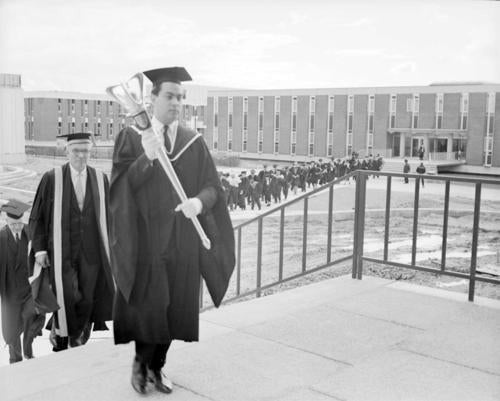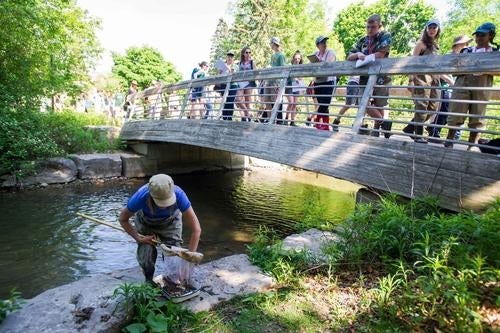Editor:
Brandon Sweet
University Communications
bulletin@uwaterloo.ca
Eric Mazur speaks on teaching innovation today
Harvard professor and teaching innovator Eric Mazur will visit campus this afternoon and deliver a Presidential Lecture on innovation in teaching and learning.
Professor Mazur is the Balkanski Professor of Physics and Applied Physics and Dean of Applied Physics at Harvard University. Mazur is a prominent physicist known for his contributions in nanophotonics.
In education he is widely known for his work on Peer Instruction, an interactive teaching method aimed at engaging students in the classroom and beyond.
President Feridun Hamdullahpur will provide opening remarks, and Professor Mazur's lecture will be followed by a Q+A session, moderated by Associate Vice-President, Academic Mario Coniglio.
The event takes place at Federation Hall today at 2:00 p.m. Doors open at 1:45 p.m. There's still time to register.
The event will also be livestreamed.
A place for the mace in the Convocation space

Biology professor Ron Eydt carries the mace from Modern Languages to the Arts Library (now the Dana Porter Library) in October 1965. Chancellor Dana Porter walks behind.
The University of Waterloo will be holding its one hundred and sixteenth Convocation from June 12 to 16 next week, and front and centre in the ceremony and the celebration is a striking symbol - the University's mace.
The solid silver and ebony staff was gifted to the University in 1965 by the family of the late Stanley F. Leavine, a charter member of the University's Board of Governors who served as its first vice-chairman.
The ceremonial mace weighs about 15 pounds and is made of silver, except for a black insert of ebony on which are mounted the arms of the University and the Province of Ontario. The inscription reads "In memory of Stanley F. Leavine."
Why a mace? Historically speaking, maces are a powerful symbol of authority, derived from their practical purpose—a club or cudgel that served as an instrument of power and might.
For ornamental rather than offensive reasons, in 1965 the University's Senate struck a committee to develop some general principles that would allow the finished product to express basic themes of the University's character. Committee members included T. L. "Ted" Batke, the University's first vice-president, academic, the University's Registrar Allan Gordon, Vice-President, Finance Al Adlington and E. M. "Mike" Brookes, director of the department of planning.
The essential theme as communicated to the mace's designer was "the concept of an underlying unity embracing variety and apparent diversity."
Toronto artist Eric Aldwinckle designed the mace and silversmith Harold Stacey was responsible for crafting it. (Fun fact: Aldwinckle's great-grandnephew David works in Information Systems & Technology.)
The mace was presented at the University's eleventh Convocation ceremony held on October 22, 1965.
"This University is a young and still flexible individual that has arrived only relatively recently on the academic scene," Batke said during the presentation ceremony. "And yet at the same time it is representative of a scholarly tradition that has survived many centuries of change and still thrives today in vigorous growth."
"The visual symbol, the Mace, allows an immediacy of meaning impossible to attain in any other way," said Batke. "It sustains, deepens and makes more vivid the sense of historical continuity in the life of the institution."
"The symbolic of theme of the mace is unity amid diversity and the tension in the creative intellectual process that strives to bring forth a new individual," Batke continued. "This is interpreted through the idiom of the life process: from the seeds at the base of the stave the mace grows in unity and strength until it differentiates by a four-fold separation into diverse elements."
This four-fold diversity is significant because of the four Faculties that existed at Waterloo at the time of the mace's crafting, as well as the four federated and affiliated institutions that had joined with the University.
These four diverse elements (perhaps today worth one-and-a-half Faculties each to get to a total of six) together form a crown and the points of that crown, while tending toward a union, do not quite touch, remaining as individuals while still engaged in a deep harmony.
"And it is here that Mr. Aldwinckle displayed a profound genius of insight into the nature of universities," said Batke. "This creative process is focused not on the traditional spherical orb of static perfection but rather on an elliptical silver ovum - the egg-shaped symbol of creativity, and the marvellous potential of a new individual life.
Since its presentation to the University in 1965, the mace has been a key part of Convocation ceremonies, entering near the end of the academic procession and held proudly by a mace-bearer, usually a member of the Faculty whose convocation is being celebrated. One hundred and four (and by next week, one hundred and five) Convocations later, it remains a symbol of the University's authority, a beautiful rather than blunt instrument.
Environment holds provincial round of North American Envirothon

Last week, the Faculty of Environment hosted the Ontario Envirothon, a collaborative, interactive event with an environmental focus, designed to develop critical thinking, problem solving, teamwork, leadership and communication skills. Organized by Forests Ontario with the help of Environment staff and volunteers, the team-based competition for high school students was the provincial round for a North America-wide Envirothon, the finals of which will take place in Idaho this July.
21 teams from across Ontario stayed at St. Paul’s University College, participated in educational workshops, planted 500 trees on our campus, and competed to develop an environmentally sustainable proposal for the Region of Waterloo. The winning team, representing University of Toronto Schools, offered a solution which involved the minimization of infrastructure-related energy expenses. The team from Waterloo Collegiate Institute, winners of the Regional Envirothon, also won third place in the provincial round. Each presentation was remarkable with students displaying a strong understanding of the ecological problems our planet faces.
Forests Ontario CEO Rob Keen said that while the contest positions the students as “leaders of tomorrow,” they are really the “leaders of today,” as their actions and ambition are bound to make a positive impact on communities in Canada and beyond.
“It’s been an incredible journey,” says Mirjana (pictured above), on behalf of her team. “It’s such a good opportunity to meet people from different places and backgrounds, both English- and French-speaking. We come from different places, but what we share is passion for the environment, and that’s what unites us.” Mirjana is a student at the University of Toronto Schools, member of the Ontario Envirothon 2018 winning team.
Scotland's First Minister invites professor to conference
Professor Bryan Smale, director of the Canadian Index of Wellbeing housed in the Faculty of Applied Health Sciences, has been invited by the Right Honourable Nicola Sturgeon, First Minister of Scotland to give a keynote address at a conference on wellbeing.
The National Performance Framework international conference, co-hosted by the Scottish Government, is marking 10 years of reporting national measures of wellbeing. Scotland's National Performance Framework was introduced in 2007 and provides a clear vision for Scotland with broad measures of national wellbeing covering a range of economic, health, social and environmental indicators and targets.
The conference will be attended by about 120 delegates from various professions and backgrounds.
Smale is a professor in Recreation and Leisure Studies who studies leisure, health, and the well-being of individuals and communities and was personally invited by First Minister Sturgeon to attend.
The conference takes place on June 11 in Edinburgh.
Updates on class and midterm relocations
In the wake of yesterday's fire incident on campus, the Registrar's Office is maintaining a list of relocated classes and midterms on its website.
Link of the day
When and where
Undergraduate School on Experimental Quantum Information Processing (USEQIP), Monday, May 28 to Friday, June 8, Institute for Quantum Computing.
Bike Month, Friday, June 1 to Saturday, June 30, across campus.
UWAG and Fine Arts present "This Could Be The Place: Performance Art Symposium," Monday, June 4 to Saturday, June 9, University of Waterloo Arts quad.
Deadline to apply for Balsillie School of International Affairs Transformative Leadership Program, Friday, June 8.
IT Seminar, “OHEIT Conference Highlights”, Friday, June 8, 9:00 a.m., EC5 1111.
Retirement celebration for Laura Johnson, Friday, June 8, 11:30 a.m. to 1:30 p.m., EV3-3rd Floor Patio. RSVP to Tiffany Chen, tiffany.chen@uwaterloo.ca.
Presidential Lecture featuring Professor Eric Mazur, Harvard University, Friday, June 8, 2:00 p.m., Federation Hall. Register on Ticketfi.
Coping Skills Seminar - Cultivating Resiliency, Monday, June 11, 5:00 p.m., HS 2302.
Spring 2018 Convocation, Tuesday, June 12 to Saturday, June 16, Physical Activities Complex.
University Club Spring Convocation Luncheon, Tuesday, June 12 to Saturday, June 16, 11:30 a.m. to 2:00 p.m., University Club.
Grammar studio series: Workshop 3, Tuesday, June 12, 10:00 a.m.
Challenge Yourself: International Co-op, Tuesday, June 12, 12:30 p.m., TC 1208.
Exploring Your Personality Type, Tuesday, June 12, 1:30 p.m., TC 1112.
Deep homogeneous mixture models: Representation, separation, and approximation, featuring Priyank Jaini, David R. Cheriton School of Computer Science, Tuesday, June 12, 3:00 p.m., DC 2306C.
Discover Your Career Values (for employees only), Wednesday, June 13, 12:00 to 1:00 p.m., TC2218.
Faculty of Science Convocation Awards luncheon, Wednesday, June 13, 12:00 p.m., University Club.
WaterTalk Lecture Series - "Decoding the Secrets of Carbon Preservation in Peatlands along a Boreal to Tropical Gradient from Minnesota to Peru", Wednesday, June 13, 2:00 p.m., QNC 0101.
Coping Skills Seminar - Strengthening Motivation, Wednesday, June 13, 4:00 p.m., HS 2302.
Nukes and the Nobel: A Conversation with Setsuko Thurlow, Wednesday, June 13, 7:30 p.m., reception at 6:45 p.m. in Atrium, Conrad Grebel University College Great Hall.
Velocity Start: Do People Want Your Sh*t?, “Learn about topics related to market validation,” Wednesday, June 13, 7:30 p.m., Velocity Start, SCH 2nd Floor.
Grammar studio series: Workshop 4, Thursday, June 14, 10:00 a.m.
ROM Daytime: Transforming Space: Can Architecture Come Alive?, Speaker: Philip Beesley, School of Architecture, Thursday, June 14, 11:00 a.m., Royal Ontario Museum.
Design and deliver I: Presentation Essentials, Thursday, June 14, 1:00 p.m. to 3:30 p.m.
How to be an Exceptional Employee, Thursday, June 14, 1:30 p.m., TC 1208.
The Quantum Valley Investments® Problem Pitch Competition, Thursday, June 14, 7:00 p.m., AL 105.
Matthews Golf Classic, Monday, June 18, Grand Valley Golf Course, Cambridge.
Bridge to 2020: A Look Back, A Look Ahead, Monday, June 18, 10:00 a.m., Federation Hall. Register today!
WaterTalk Lecture Series - "Modelling River Basins as Coupled Human and Natural Systems”, June 18, 4:00 p.m., DC 1302.
NEW - University Senate meeting, Monday, June 18, 3:30 p.m., NH 3407.
Hallman Lecture featuring CBC broadcaster Scott Russell, “Building a Stronger Canada through Values-based Sport,” Tuesday, June 19, 7:00 p.m., AHS 1689.
NEW - Velocity Fund $5K and $25K applications close, “Today’s Velocity Fund winners, tomorrow’s innovative companies,” Tuesday, June 19, 11:59 p.m.
NEW - Velocity Start: How To Find Your Customers Online, “Conduct online market research,” Wednesday, June 20, 7:30 p.m., Velocity Start, SCH 2nd Floor.
NEW - LGBTQ+ Making Spaces workshop, Wednesday, June 20, 9:00 a.m., STC 2002
NEW - Inaugural Wes Graham Research Symposium & Computer Science Awards, A celebration of Wes Graham’s legacy through the establishment of fellowships, Thursday, June 21, 9:30 a.m. to 3:30 p.m., DC 1302.
NEW - Free three-day programming workshop for beginners, Friday, June 22, 2018 at 5:30 p.m. Sunday, June 24 at 5:00 p.m. Applications close June 3, 2018.
NEW - Toronto Pride Parade, Sunday, June 24, 9:30 a.m. to 7:00 p.m.
NEW - WISE Public Lecture: Health Impacts of Climate Change and Climate Policy, Tuesday, June 26, 10:30 a.m., DC 1304.